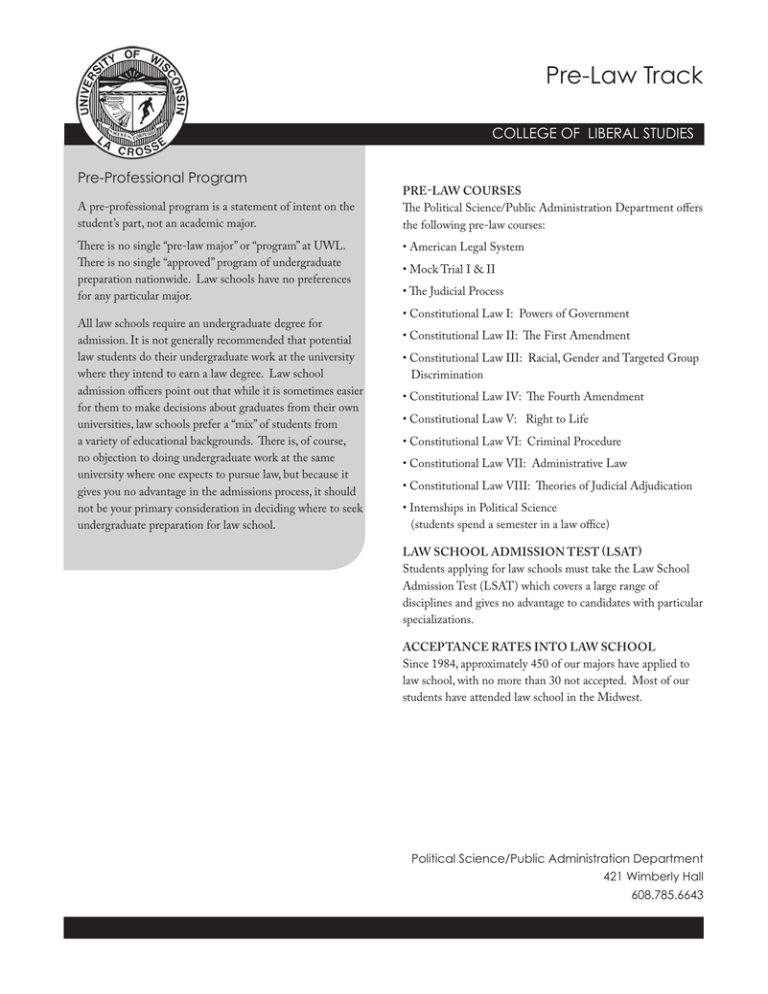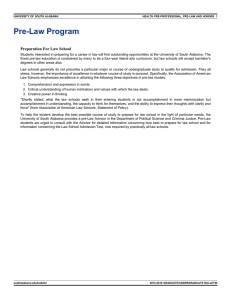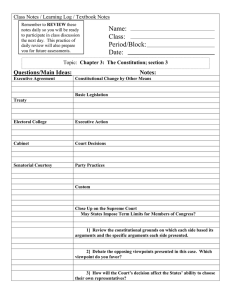Pre-Law Track COLLEGE OF LIBERAL STUDIES COLLEGE OF LIBERAL STUDIES Pre-Professional Program
advertisement

Pre-Law Track COLLEGE OF LIBERAL STUDIES Pre-Professional Program A pre-professional program is a statement of intent on the student’s part, not an academic major. There is no single “pre-law major” or “program” at UWL. There is no single “approved” program of undergraduate preparation nationwide. Law schools have no preferences for any particular major. All law schools require an undergraduate degree for admission. It is not generally recommended that potential law students do their undergraduate work at the university where they intend to earn a law degree. Law school admission officers point out that while it is sometimes easier for them to make decisions about graduates from their own universities, law schools prefer a “mix” of students from a variety of educational backgrounds. There is, of course, no objection to doing undergraduate work at the same university where one expects to pursue law, but because it gives you no advantage in the admissions process, it should not be your primary consideration in deciding where to seek undergraduate preparation for law school. COLLEGE OF LIBERAL STUDIES PRE-LAW COURSES The Political Science/Public Administration Department offers the following pre-law courses: • American Legal System • Mock Trial I & II • The Judicial Process • Constitutional Law I: Powers of Government • Constitutional Law II: The First Amendment • Constitutional Law III: Racial, Gender and Targeted Group Discrimination • Constitutional Law IV: The Fourth Amendment • Constitutional Law V: Right to Life • Constitutional Law VI: Criminal Procedure • Constitutional Law VII: Administrative Law • Constitutional Law VIII: Theories of Judicial Adjudication • Internships in Political Science (students spend a semester in a law office) LAW SCHOOL ADMISSION TEST (LSAT) Students applying for law schools must take the Law School Admission Test (LSAT) which covers a large range of disciplines and gives no advantage to candidates with particular specializations. ACCEPTANCE RATES INTO LAW SCHOOL Since 1984, approximately 450 of our majors have applied to law school, with no more than 30 not accepted. Most of our students have attended law school in the Midwest. Political Science/Public Administration Department 421 Wimberly Hall 608.785.6643 Pre-Law Track COLLEGE OF LIBERAL STUDIES AMERICAN BAR ASSOCIATION GUIDELINES The American Bar Association offers some guidelines in preparing for a successful entry into law school and the legal profession: 1) Select an interesting and challenging major--one that you are likely to do well at, which involves a substantial amount of independent work and which requires you to analyze and organize materials verbally and/or in writing. Acquiring excellent oral and written communication skills cannot be overemphasized. 2) If one or more minors are taken, apply the same criteria. Additionally, it does no harm if they equip you with a “marketable” (and practical) skill--accounting, computer science, foreign language, mathematics or statistics--in or out of a law firm. 3) There are a number of courses, which are of special benefit in subsequent law school work: accounting will be useful when you encounter courses in corporations, taxes, and other business areas. Courses in math and statistics will acquaint you with quantitative measurement. Logic is recommended for the purpose of developing powers of imaginative and incisive reasoning. Any and all English courses will improve the ability to read and write; and speech and debate will improve verbal skills. Each student should fill out his/her undergraduate program with courses which compensate for inadequate study habits and/or deficiencies in areas of knowledge. But, again, the ability to quickly absorb, analyze and organize a vast amount of written materials is crucial to success in law school. 4) Your choice of major may depend upon the kind of law practice you envisage, if you are able to make a decision now. Thus, business and economics obviously provide an excellent background for those entering corporate practice; sociology and criminology relate well to criminal justice work; and political science and/or public administration (perhaps the most common major) will especially serve the needs of those who contemplate public service, elective or otherwise. 5) Increasingly, law schools are taking note of extracurricular activities and work experiences as criteria for admission. UWL offers Mock Trial courses that allow students to learn about the judicial system, understand what trial lawyers do, and develop crucial critical thinking skills by going against other schools which go to Mock Trial competitions. Significant and sustained participation in some form of community service, on or off campus, is a decided plus as well. UWL’s internship program, offered for variable credit, provides an acceptable supplement to academic training. Internship positions--paid and unpaid--are available in public offices, law firms, and other private businesses. Though none of these things will substitute for a specific entrance requirement, they may entitle an applicant to more favorable consideration than he/she would otherwise receive. 118


